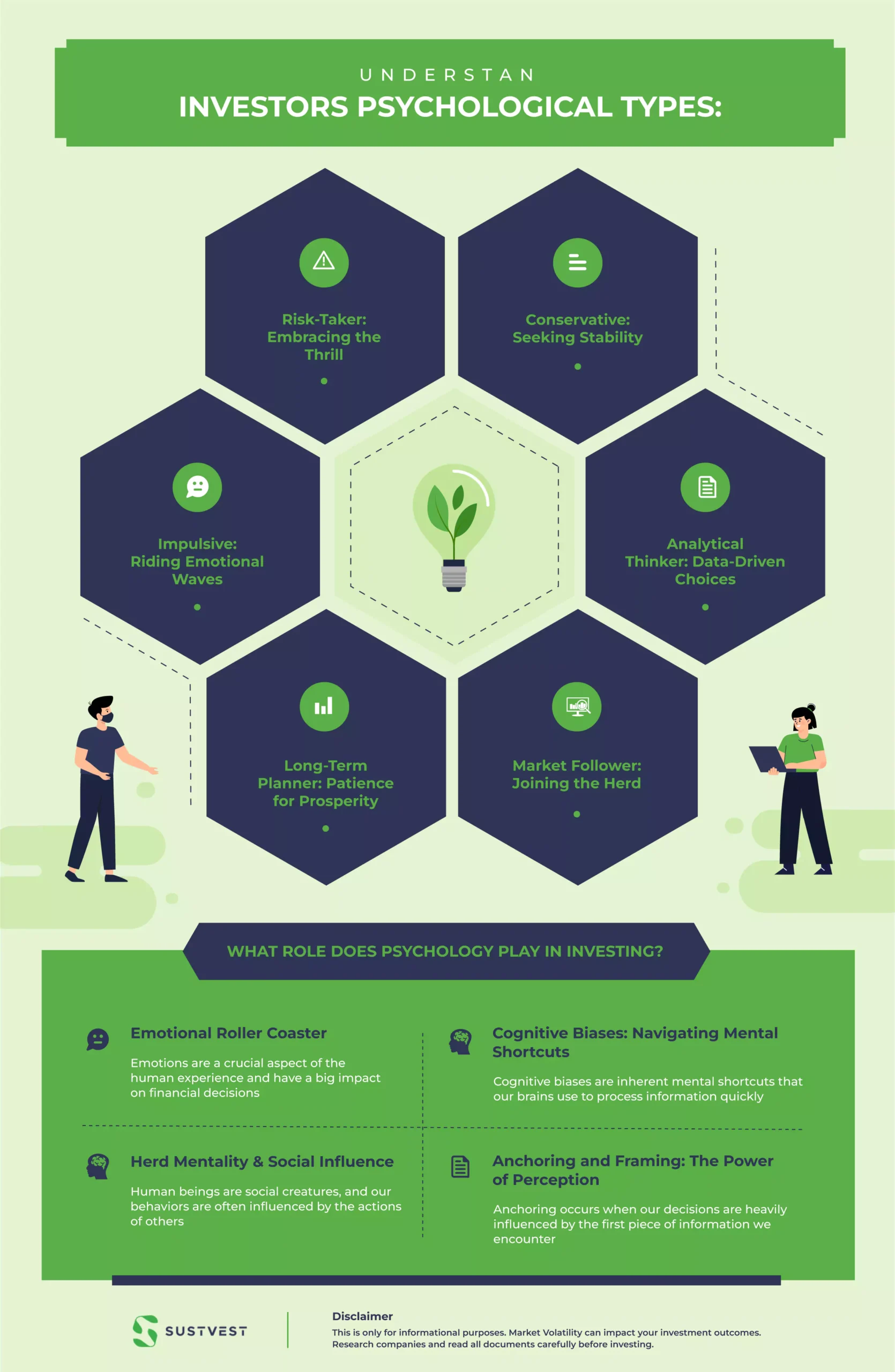Are you planning to start your investment journey? If Yes, then you should first try and understand the mind that creates wonders. Investor psychology is important to understand investing.
Don’t you think that before making any investment decision it is important to understand “how this decision is being made”
Knowing which road- short-term vs. long-term will benefit you and will lead to a smooth financial ride for your current and future goals is crucial.
In this blog, we will take a plunge into the realm of investor psychology and understand What is Investors Psychology? Also, exploring its nuances, effects on investment decisions, and strategies to navigate its potential pitfalls.
Let’s dive in.

Understand the Mindset Behind Financial Decisions
Investing is a dynamic journey that triggers a range of emotions. From excitement and euphoria during bull markets to fear and panic during downturns, emotions influence our perception of risk, reward, and market conditions.
Investor psychology often oscillates between the poles of fear and greed. During market upswings, the allure of potential gains drives our decisions, while during downturns, fear of losses can lead to panic selling.
Recognizing this emotional pendulum can help us maintain a more balanced and rational approach to our investments.
What are the four behavioral investor types?
As the name suggests, the behavioral investor is one who often makes investing decisions based on their emotions and cognitive biases rather than being logical and rational.
Behavioral finance and behaviour investing is a fascinating field that merges psychology and economics and has identified four distinct behavioral investor types.
These profiles shed light on how individual personalities influence financial decision-making and help you understand the psychology of investors behaviour.
Preserver: A preserver is an investor who always prioritizes financial stability and money preservation over taking risks to increase wealth.
They are likely to have a much lower tolerance for the ups and downs of the market.
Such investors are considered the guardian of their assets. They can be overly cautious and slow to take decisions. Also, they take their losses very seriously.
Follower: As the name suggests, the follower is an investor who doesn’t apply their mind while investing and also lacks interest. Due to this, they don’t have their ideas about investing.
This kind of investor tends to follow the herd.
Independent: An independent investor is the doer and has their ideas about investing, unlike the follower.
They are quite engaged in the financial market and don’t often have the herd mentality.
This helps them to make independent decisions.
Also, they pride themselves on their investing achievements. Independents are fundamentally analytical, critical thinkers who frequently base their choices on reason and intuition.
Accumulator: An accumulator is an investor who accumulates wealth more and they are very confident while making investments.
This kind of investor has a great track record of business because of their self-confidence, they achieve success in their investing endeavors. Because of these abilities, they can withstand the ups and downs of the market.
Understand Investors Psychological Types:
Investing is not just about numbers and data; it’s also deeply influenced by the unique psychological profiles of individual investors.
The diverse spectrum of personalities and different aspects of investors psychology plays a significant role in shaping financial decisions.
Risk-Taker: Embracing the Thrill
Risk-takers thrive on the excitement of investing. They are comfortable with taking calculated risks in pursuit of higher returns. These investors often venture into volatile markets, startups, or speculative ventures, drawn by the potential for substantial gains.
Conservative: Seeking Stability
Conservative investors prioritize capital preservation and stability. Conservatives in general are risk-averse people and they favor low-risk. Hence this kind of behavior affects their investments too and they end up in low-return investments. These individuals always look for safer options.
Impulsive: Riding Emotional Waves
Impulsive investors make decisions based on emotions and instincts. They may react hastily to market trends or news, leading to frequent buying and selling of investments. Impulsiveness can result in erratic behavior, potentially causing losses due to emotional reactions to market fluctuations.
Analytical Thinker: Data-Driven Choices
Analytical thinkers approach investments with a logical and systematic approach. They conduct extensive research, analyze data, and base decisions on facts rather than emotions. These investors are less likely to be swayed by market volatility and make informed, data-driven choices.
Long-Term Planner: Patience for Prosperity
Long-term planners prioritize future financial well-being. They create diversified portfolios and adhere to a consistent investment strategy over time, regardless of short-term market movements. This patient approach often leads to steady growth and the achievement of long-term financial goals.
Market Follower: Joining the Herd
Market followers tend to make investment decisions based on trends and popular choices. They may follow the crowd, often influenced by the behavior of other investors. While this approach can yield short-term gains, it may lead to suboptimal decisions if not based on thorough analysis.
What role does psychology play in investing?
In the intricate world of investing, numbers, and data often take center stage. The human mind does, however, play a significant role in investing, and this must be understood.
It is a noteworthy fact that we humans undergo extreme reactions. Our decisions are heavily impacted by the way we feel. And so it is beneficial to learn the role psychology plays in investing.
Nonetheless, it is critical to learn the psychology of investors’ behaviour to make better investing decisions.
Emotional Roller Coaster
Emotions are a crucial aspect of the human experience and have a big impact on financial decisions. Bull markets’ anticipation of possible gains and bear markets’ dread of losses can cause emotional highs and lows that affect our decisions.
Making logical financial decisions requires the ability to recognize and control these emotions.
Cognitive Biases: Navigating Mental Shortcuts
Cognitive biases are inherent mental shortcuts that our brains use to process information quickly. Investors believe that these biases are evolved to help us make fast decisions but generally end up in the ashtray.
Confirmation bias is the tendency to seek, interpret, or favor information that confirms preexisting beliefs or hypotheses.
Herd Mentality and Social Influence
Human beings are social creatures, and our behaviors are often influenced by the actions of others. Herd mentality, where investors follow the crowd without thorough analysis, can lead to groupthink and market bubbles.
Understanding this phenomenon can help us make more independent and informed decisions, avoiding the pitfalls of blindly following the herd.
Anchoring and Framing: The Power of Perception
Anchoring occurs when our decisions are heavily influenced by the first piece of information we encounter. Similarly, the framing effect reveals how the presentation of information can alter our perceptions.
These psychological phenomena can impact our behaviour investing and judgments about the value and risk of investments, emphasizing the need for awareness and objectivity.
Strategies to Navigate Investor Psychology
- Education: Understanding common cognitive biases and emotional triggers equips us to recognize when they are influencing our decisions.
- Diversification: Spreading investments across various asset classes reduces the risk associated with emotional decision-making tied to a single investment.
- Professional Guidance: Financial advisors can provide objective insights, helping us stay grounded and make informed choices even in the face of emotional turbulence.

FAQs: What Is Investors Psychology?
What is investor psychology?
Investor psychology refers to the study of how human emotions, cognitive biases, and behavior influence financial decision-making. It explores how psychological factors impact investment choices and market trends.
How do emotions impact investment decisions?
Emotions such as fear, greed, and excitement can lead investors to make impulsive decisions based on short-term market fluctuations and varied aspect of investors psychology such as emotional decisions can often result in buying at market highs and selling during downturns.
What are cognitive biases?
Cognitive biases are mental shortcuts that our brains use to process information quickly. These biases can lead to irrational decisions, as we may rely on preconceived notions and overlook objective data.
How does herd mentality affect investing?
Herd mentality occurs when investors follow the actions of the crowd without conducting a thorough analysis. This can lead to market bubbles and overvalued assets, as individual judgments are influenced by the behavior of others.
Wrapping up:
Unquestionably, psychology has a role in investing, influencing how we perceive risk, make choices, and respond to market swings. Investors can create plans to make more informed and logical decisions by becoming aware of the impact of emotions, biases, and cognitive processes.
With the help of understanding investor psychology, you can make educated and logical investment decisions.
Happy Investing!

Founder of Sustvest
Hardik completed his B.Tech from BITS Pilani. Keeping the current global scenario, the growth of renewable energy in mind, and people looking for investment opportunities in mind he founded SustVest ( formerly, Solar Grid X ) in 2018. This venture led him to achieve the ‘Emerging Fintech Talent of the Year in MENA region ‘ in October 2019.




